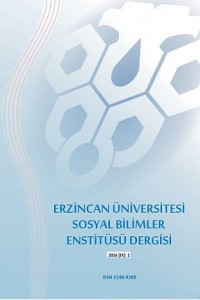Abstract
In this study we discussed that suffixes such as “+ı”, “+i”, “+u”, “+ü” in Turkish are not accusative. These suffixes make the nouns definite. For example: In the following sentences “Hasan camı kırdı / Hasan broke the glass” and “Kedi sütü içti / The cat drank the milk” window and milk words were made definite through these suffixes. That is, with “+ı” and “+ü”. In this sentences these words were made passive particple through transitive verbs, not through these suffixes. Therefore these suffixes not be examined under the title of accusative but it should be examined under the title of definite article and it should also be introduced like that. Nouns that have taken these suffixes must be named as passive particple.
References
- Banguoğlu, Tahsin (1974). Türkçenin Grameri, İstanbul: Baha Matbaası.
- Demir ve Yılmaz (2003). Türk Dili El Kitabı, Ankara: Grafiker Yayıncılık.
- Deny, Jean (2009). Türk Dil Bilgisi Modern Türk Dil Bilgisi Çalışmalarının Kapsamlı İlk Örneği, çev. Elöve, Ali Ulvi, uy. Benzer, Ahmet, İstanbul: Kabalcı Yayınevi.
- Dooley, Jenny ve Evans Virginia (1999). Grammarway, Swansea: Express Publishing.
- Ediskun, Haydar (2010) Sesbilgisi-Biçimbilgisi-Cümlebilgisi Türk Dilbilgisi, İstanbul: Remzi Kitabevi.
- El-Ğelâyînî, Mustafa (1996). Câmiu’d-Durûsi’l Arabiyye, Beyrut: El-Mektebetu’l-Asriyye.
- Ercilasun, Ahmet Bican ve Karahan, Leylâ (t.y.). Liseler İçin Ders geçme ve kredi sistemine göre Türk Dili ve Edebiyatı Türk Dili 3, İstanbul: Deniz Yayınevi.
- Ercilasun, Ahmet Bican ve Karahan, Leylâ (1996). Liseler İçin Ders geçme ve kredi sistemine göre Türk Dili ve Edebiyatı Türk Dili 4, İstanbul: Deniz Yayınevi.
- Ercilasun, Ahmet Bican (2009). Başlangıçtan Yirminci Yüzyıla Türk Dili Tarihi, Ankara: Akçağ.
- Ergin, Muharrem (1990). Üniversiteler İçin Türk Dili (5. Baskı), İstanbul: Bayrak Basım / Yayım /tanıtım.
- Gabain, A. Von (2007). Eski Türkçenin Grameri, çev. Akalın, Mehmet, Ankara: Tür Dil Kurumu Yayınları
- Gencan, Tahir Nejat (1992). Dilbilgisi Lise I. II. III., İstanbul: Kanaat Yayınları.
- Gencan, Tahir Nejat (2001). Dilbilgisi, Ankara: Ayraç Yayınları.
- Göğüş, Beşir (1995). Ortaokulları İçin Türkçe Dersleri 8, y. y. : Altın Kitaplar Yayınevi.
- İlker, Ayşe Biray, Himmet Özbay, Hüseyin Tamir, Ferhat Tural, Güzin Kasapoğlu, Hülya Pekacar, Çetin (1993). Ders Geçme ve Kredi Sistemine Göre Türk Dili ve Edebiyatı Türk Dili, İstanbul: M. E. B. Devlet Kitapları.
- Korkmaz, Zeynep (2009). Türkiye Türkçesi Grameri Şekil Bilgisi, Ankara: Türk Dil Kurumu Yayınları.
- Kurt, M. Hakkı (1998). Dil Bilgisi İlköğretim 6, İstanbul: Morpa Kültür Yayınları.
- Uralgiray, Yusuf (1986). Arabça İlk ve İleri Dilbilgisi, Riyad: Tebliğ Yayınları, İstanbul.
Abstract
Bu çalışmada Türkçedeki “+ı”, “+i”, “+u”, “+ü” hâl eklerinin isimleri yükleme hâline sokmadıklarını, onları belirli yaptıkları konusunu tartıştık. Mesela, “Hasan camı kırdı” ve “Kedi sütü içti” cümlelerinde “cam” ve “süt” kelimeleri bu eklerle belirli yapılmışlarıdır. Bu kelimeleri bu cümlelerde etkilenmiş unsurlar hâline getirense fiillerin geçişli oluşlarıdır. Bu sebeple bu ekler, “yükleme hâli” başlığı altında değil, “belirtme ekleri” başlığı altında incelenmeli ve öyle de tanıtılmalıdır. Bu ekleri almış isimlere de “yükleme halindeki isimler” değil, “yüklenilmiş, edilgin veya belirli isimler” denmelidir.
References
- Banguoğlu, Tahsin (1974). Türkçenin Grameri, İstanbul: Baha Matbaası.
- Demir ve Yılmaz (2003). Türk Dili El Kitabı, Ankara: Grafiker Yayıncılık.
- Deny, Jean (2009). Türk Dil Bilgisi Modern Türk Dil Bilgisi Çalışmalarının Kapsamlı İlk Örneği, çev. Elöve, Ali Ulvi, uy. Benzer, Ahmet, İstanbul: Kabalcı Yayınevi.
- Dooley, Jenny ve Evans Virginia (1999). Grammarway, Swansea: Express Publishing.
- Ediskun, Haydar (2010) Sesbilgisi-Biçimbilgisi-Cümlebilgisi Türk Dilbilgisi, İstanbul: Remzi Kitabevi.
- El-Ğelâyînî, Mustafa (1996). Câmiu’d-Durûsi’l Arabiyye, Beyrut: El-Mektebetu’l-Asriyye.
- Ercilasun, Ahmet Bican ve Karahan, Leylâ (t.y.). Liseler İçin Ders geçme ve kredi sistemine göre Türk Dili ve Edebiyatı Türk Dili 3, İstanbul: Deniz Yayınevi.
- Ercilasun, Ahmet Bican ve Karahan, Leylâ (1996). Liseler İçin Ders geçme ve kredi sistemine göre Türk Dili ve Edebiyatı Türk Dili 4, İstanbul: Deniz Yayınevi.
- Ercilasun, Ahmet Bican (2009). Başlangıçtan Yirminci Yüzyıla Türk Dili Tarihi, Ankara: Akçağ.
- Ergin, Muharrem (1990). Üniversiteler İçin Türk Dili (5. Baskı), İstanbul: Bayrak Basım / Yayım /tanıtım.
- Gabain, A. Von (2007). Eski Türkçenin Grameri, çev. Akalın, Mehmet, Ankara: Tür Dil Kurumu Yayınları
- Gencan, Tahir Nejat (1992). Dilbilgisi Lise I. II. III., İstanbul: Kanaat Yayınları.
- Gencan, Tahir Nejat (2001). Dilbilgisi, Ankara: Ayraç Yayınları.
- Göğüş, Beşir (1995). Ortaokulları İçin Türkçe Dersleri 8, y. y. : Altın Kitaplar Yayınevi.
- İlker, Ayşe Biray, Himmet Özbay, Hüseyin Tamir, Ferhat Tural, Güzin Kasapoğlu, Hülya Pekacar, Çetin (1993). Ders Geçme ve Kredi Sistemine Göre Türk Dili ve Edebiyatı Türk Dili, İstanbul: M. E. B. Devlet Kitapları.
- Korkmaz, Zeynep (2009). Türkiye Türkçesi Grameri Şekil Bilgisi, Ankara: Türk Dil Kurumu Yayınları.
- Kurt, M. Hakkı (1998). Dil Bilgisi İlköğretim 6, İstanbul: Morpa Kültür Yayınları.
- Uralgiray, Yusuf (1986). Arabça İlk ve İleri Dilbilgisi, Riyad: Tebliğ Yayınları, İstanbul.
Details
| Journal Section | Articles |
|---|---|
| Authors | |
| Publication Date | June 15, 2016 |
| Submission Date | July 1, 2016 |
| Published in Issue | Year 2016 Volume: 9 Issue: 1 |


